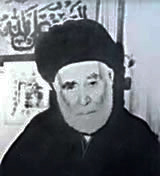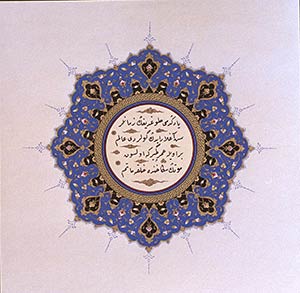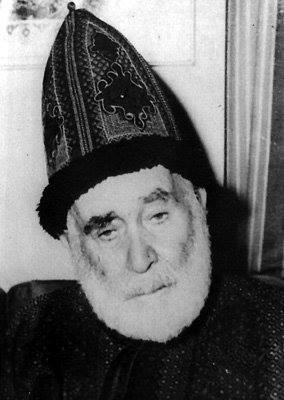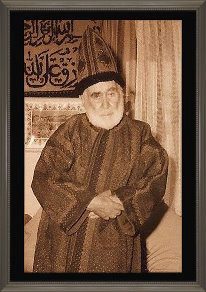Shaykh Muhyiddin Ansari Biography
Shaykh Muhyiddin Ansari, the son of Shaykh Muhammad Ansari, was born in Erzincan, Turkey, in 1897. He passed away on January 9, 1978. Shaykh Muhyiddin was a descendent of Prophet Muhammad, peace be upon him. Because he carried our Prophet’s genes, he had a great capacity for compassion and mercy, was endowed with much patience and willingness to help, and had an immense love for Allah and the power that comes with it.
Shaykh Muhyiddin was a seasoned soldier of both the outer and inner worlds. He lived in Istanbul, and was in the military during the Ottoman Empire war. He was an officer in the army. He contracted diabetes and other illnesses during this period, and patiently endured their discomforts for the rest of his life.

Shaykh Muhyiddin was also a musician and a teacher, and ran a good, organized dergah. In his dergah, the Ayni Ali Baba Tekke in Istanbul, there were musicians who practiced new ilahis, or Sufi songs, every week. The word “Muhyi” in an ilahi indicates that the ilahi was written by Shaykh Muhyiddin Ansari.

Shaykh Muhyiddin Ansari raised a hundred very mature khalifas. His khalifas have been serving in Bosnia, Yugoslavia, Turkey, Germany, and many other areas around the world, including the United States.
One year during Laylatul Qadr, the Night of Power, the Shaykh led the customary prayer for a hundred thousand people right in the middle of Istanbul. Sufism was banned in Turkey at that time, but the police could not prevent his leading the public prayer because of the spiritual power bestowed upon him. Ataturk closed all of the dergahs but his. In fact, Ataturk himself came and helped to repair his dergah. Many miracles were attributed to Shaykh Muhyiddin Ansari during his lifetime. He could have had anything he wished for, being such a distinguished friend of Allah, but he never abused the power which Allah bestowed upon him. Above all, he exemplified the qualities of humility and surrender.
On Shaykh Muhyiddin Ansari by Shaykh Taner Ansari
My beloved Shaykh is Shaykh Muhyiddin Ansari. Although Shaykh Muhyiddin is not in the body, he is still running our tariqa spiritually. His alias is “Muhyi,” (Ya Muhyi – The Reviver – one of Allah’s Most Beautiful Names) for “Muhyiddin.”
When he was sick, one of his khalifas led the zikr, which was held at the dergah twice a week, or every night during Ramadan. He had very mature, very good khalifas. However, my Shaykh never advertised himself. He didn’t go for fame.
When Allah loves you, Allah becomes your hands, your feet, and your eyes. If somebody breaks your heart, Allah opens a war against him. Allah is this close to you; He is your Friend. When Allah loves you, He can say, as in Qur’an-i Karim (The Generous Qur’an), “O Muhammad, you didn’t throw those arrows, I did; you didn’t throw those rocks, I did.” If and when you come to that state you have to be very careful. As you get closer to Allah the standards of behavior get finer. In that circle you are punished right away for your misdeeds. At the same time, when you are in that position, as my Shaykh was, Allah grants your wishes. Muhyiddin Baba could have anything he wished for, but never abused the power that Allah bestowed upon him. This is a very important point.

For my Shaykh, as it should be for all Sufis, it was very important not to break anyone’s heart. Sufis should be able to get along with everybody. When Muhyiddin Baba was with children, he acted like a child; when he was with grownups he acted like a grownup. Whatever the mentality was of the person he was with, he went along with that. For example, one day a friend invited him to go on a treasure hunt. Shaykh Muhyiddin took one of his young dervishes along. While they were digging here and there, the young dervish was thinking, “Why is my Shaykh doing this?” Of course, his Shaykh had the ability to read thoughts, so he said, “My son, I don’t do this to get money.” He grabbed the earth and said, “Look here. Be gold.” Boom! The earth was gold. The dervish saw this with his own eyes. Shaykh Muhyiddin said, “If I want, I can do this. But I will not. I came here only because I didn’t want to break my friend’s heart.”
Another time, another Shaykh, or a so-called Shaykh, came to the dergah. Shaykh Muhyiddin was always very hospitable and showed reverence to other Shaykhs. He said to the visitor, “Please, you can lead the prayer.” The visiting Shaykh then led the prayer. After the visitor left, Shaykh Muhyiddin said, “Kids, let’s pray again,” because the visitor didn’t have wudu (ritual ablution) when he led the prayer. He didn’t say anything to the visitor so as not to shame him.

When I was first initiated, I said, “I want to talk to my Shaykh.” The older dervishes said, “You just go to those stairs, stay there, and he will send for you.” I said to myself, “How is this going to work? I’m going to stay there, but what if he doesn’t come. How will he know that I am there?” This is a three-story building. I am on the second floor, and he lives on the third floor. Although I wondered how my Shaykh would know I was there, I waited there anyway. I waited in the traditional way of the dervish: sitting on the floor with my legs folded under me. This is the proper way for a dervish to wait, as it has been practiced for centuries. After some time, my Shaykh sent somebody to get me. They let me in; I prostrated and then kissed his hand. Wherever he told me to sit, I sat down. “Yes, my son?” he asked. I asked him one question. I will not tell you what that question is. Then he gave me an answer, and I’m not going to tell you that either. That’s between him and me. But in that one question, with one answer, he enlightened me. I got everything in that answer, and I left.
My Shaykh could go to the middle of the town, sit there and make zikr. You could bring the whole army there, and not be able to stop him. If he didn’t want it, nobody could touch him. This is Allah’s power. True Shaykhs have this ability whether they are living or dead.
Some years ago someone tried to burn down our dergah in Istanbul. This has happened several times over the years. Each time they throw a Molotov cocktail to start a fire. The last time the whole dergah caught on fire, but my Shaykh’s maqam, his coffin and other effects did not burn. They have never been able to burn my Shaykh’s maqam. This was documented in the newspapers and on television. They cannot burn it. His wife died from smoke inhalation, but nothing happened to the maqam.
When Muhyiddin Baba was alive, the dervishes were so humble. They used to kiss one another on the shoulder, they were so nice. As soon as he passed away, everybody started fighting. When you have a Shaykh like this, it is not easy to take his post. The khalifa says, out of respect for his Shaykh, I cannot do this. I will not sit on his post and think that I deserve this, that I am equal to him. They did not want to have the responsibility that he had, because they knew what a big responsibility it was, and is.
This kind of Shaykh I have seen, alhumdulillah, thank Allah. This is a Shaykh. I’d like to be one tenth of him, one hundredth, one thousandth of him, if Allah would let me be like that. That is my Shaykh Muhyiddin Ansari.
